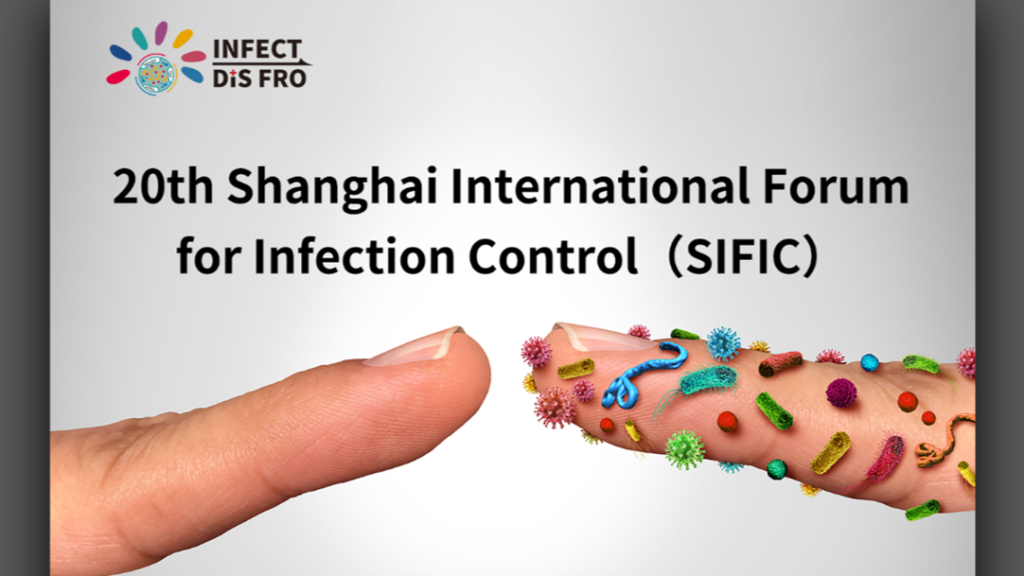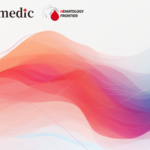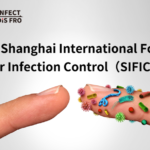
Editor's Note: On July 26, 2024, the highly anticipated 20th Shanghai International Forum for Infection Control (SIFIC), in conjunction with the 8th Oriental Forum on Complex Infectious Diseases (OFCID) and the Annual Meeting of the Global Chinese Society of Clinical Microbiology and Infectious Diseases, was grandly inaugurated at the Shanghai International Conference Center. Themed "Precision Diagnosis, Precision Control," this year's conference aims to enhance the scientific and precise approach to infection prevention and control in China. Marking SIFIC's 20th anniversary, the conference not only reflected on past achievements but also looked forward to the boundless possibilities in the field of infection control, inspiring every participant to move forward together in writing a new chapter for infection prevention and control.Opening Ceremony of the 20th SIFIC
On July 26, the 20th Shanghai International Forum on Infection Control (SIFIC) and the 8th Oriental Forum on Complex Infectious Diseases (OFCID), along with the Annual Meeting of the Global Chinese Society of Clinical Microbiology and Infectious Diseases, officially opened with grandeur.
Under the moderation of Dr. Xiaodong Gao from Zhongshan Hospital, the opening ceremony began in earnest. To commemorate SIFIC’s 20 years of achievements, a specially produced video was presented at the ceremony, leading attendees through the illustrious history of SIFIC. In the video, Dr. Bijie Hu and several other experts in the infection control field shared their heartfelt dedication and profound insights, expressing their unwavering commitment to infection control and their vision for the future. These experts collectively witnessed how SIFIC evolved from a budding concept into a leading forum for academic exchange in infection control, both domestically and internationally. This development journey not only highlighted the growing scale of the conference but also underscored SIFIC’s exceptional contributions and profound impact in promoting infection control innovation, standardizing control techniques, and enhancing global infection prevention and control capabilities.
Opening Remarks
During the opening remarks, Dr. Bijie Hu, Chairman of the conference and affiliated with Zhongshan Hospital, warmly welcomed and sincerely thanked all the attendees. He noted that over the past two decades, SIFIC has become a source of pride in China’s infection control field, contributing to the global infection control efforts. Looking ahead, Professor Hu proposed the creation of an integrated platform for academic exchange and discipline building in infection, infection control, microbiology, and antimicrobial agents, aiming to comprehensively improve China’s infection diagnosis and control capabilities. This year’s conference, with its innovative highlights and rich content, attracted 4,219 participants, setting a new record. The conference featured various initiatives, including a convenient mobile app, online guest displays, a book giveaway of Bennett and Brachman’s Hospital Infections, and a micro-video contest, all showcasing SIFIC’s continuous efforts in promoting academic exchange and innovation in science communication. Professor Hu concluded by thanking the organizers, co-organizers, and academic supporters for their hard work in preparing the event, and wished the conference great success.
Jianying Gu, from Zhongshan Hospital, delivered a speech via video. Gu emphasized the importance of infection control in ensuring medical quality and safety, pointing out that strengthening infection control is a shared responsibility and mission for all healthcare workers. This year’s conference, focusing on “Precision Diagnosis, Precision Control,” invited experts and scholars from home and abroad to deeply explore new concepts and technologies in infection control. As the host institution, Zhongshan Hospital has been actively implementing national strategies and striving to advance medical technology innovation. The hospital, led by Drs Lixian He, Bijie Hu, and Xiaodong Gao, has long been committed to exploring innovations and continuously optimizing infection control efforts, all in pursuit of providing patients with safer and more effective medical services. Secretary Gu expressed gratitude for the support from all parties and wished the conference a successful conclusion.
Dr. Erzhen Chen, Director of the Shanghai Medical Quality Control Management Center, extended his congratulations on the successful opening of the conference. Since its establishment in 2004, the Shanghai Nosocomial Infection Quality Control Center has developed a comprehensive infection surveillance network. Through innovative measures and collaboration with health departments and other professional quality control centers, the Center has made significant strides in areas such as ICU catheter-related infections, perioperative antimicrobial use, blood culture pathogen identification, and surgical site infection management, effectively controlling the incidence of nosocomial infections. Professor Chen emphasized the importance of cultivating quality control personnel in infection control, noting the Center’s leading role in advancing the national infection control discipline, which has earned it numerous honors as an outstanding quality control center over the years. He expressed his hope that this conference would further facilitate the sharing of quality control experiences, promote progress in infection control, and thanked the experts for their contributions, wishing the conference a successful outcome.
Hao Zhang, Deputy Director of the Shanghai Municipal Health Commission and Director of the Shanghai Center for Disease Control and Prevention, warmly welcomed the experts and scholars who had traveled from afar and expressed his heartfelt thanks. He highlighted that Shanghai, with its robust medical strength and exceptional research capabilities, has become a leader in the global field of infection diagnosis and control, a success attributable to the wisdom and contributions of every expert. Director Zhang elaborated on Shanghai’s grand vision of becoming a global benchmark city for public health safety, stating that this SIFIC conference serves as an important academic exchange platform for achieving this goal. He earnestly encouraged participants to fully utilize this opportunity to engage in deep exchanges, exchange ideas, and collectively explore new approaches and methods for hospital infection control, thus driving continuous progress and development in the field. He also hoped that the experts would take time to experience the unique charm and warm atmosphere of Shanghai, leaving with fond memories.
Qiulan Yang, Deputy Editor-in-Chief of Health News, the Chair of the conference, warmly congratulated the successful holding of the conference and welcomed the attending leaders, experts, and colleagues. Deputy Editor-in-Chief Yang emphasized the vital role of hospital infection control in ensuring medical safety and highlighted the country’s emphasis on infection control work and the rational use of antimicrobial agents. She pointed out that the conference theme, “Precision Diagnosis, Precision Control,” aligns with the needs of the times. Infection control personnel must possess a broad vision and professional execution skills to achieve precise diagnosis and control. Deputy Editor-in-Chief Yang also mentioned Health News‘ long-standing focus and reporting on the field of infection control, showcasing its responsibility and efforts as a mainstream media outlet in raising public awareness of infection control. She called on everyone to unite in advancing the development of China’s infection control field and wished the conference a successful conclusion.
Dachuan Li, Deputy Director-General of the Department of Medical Administration of the National Health Commission, extended a warm welcome and sincere thanks to the attending leaders, experts, and infection control colleagues. He emphasized the importance of infection control in medical quality and patient safety, and highly praised the outstanding contributions of infection control personnel in responding to public health emergencies, such as the COVID-19 pandemic. Faced with new situations and challenges, he offered five suggestions: first, to strengthen the standardized construction of infection control work; second, to promote the balanced allocation of high-quality medical resources across regions; third, to encourage model innovation and technological advancement in the infection control field; fourth, to deepen collaboration with innovative drug and medical device development companies; and fifth, to broaden international perspectives and deepen international infection control exchanges and cooperation. He urged all infection control personnel to remain true to their original mission, take on responsibilities with courage, and continuously explore new paths in infection control work with an open mind and innovative thinking, contributing “Chinese wisdom” and “Chinese solutions” to the development of the global infection control field, and working together to create a bright future for human health.
In-Depth Focus on Multi-Dimensional Topics in Infection Control
Following the opening ceremony, the conference delved into multi-dimensional topics in infection control. Experts engaged in heated discussions on key areas such as strategies for responding to severe infections, clinical responses to pandemics, the construction of infectious disease disciplines, bacterial resistance monitoring, and innovation in antimicrobial agents. These exchanges not only brought cutting-edge academic insights to the participants but also provided a clear blueprint for China’s infection control work, strongly promoting the overall development of the discipline. Looking ahead, the conference will continue to introduce specialized forums and in-depth exchanges, building a solid bridge for extensive cooperation and knowledge sharing in the field of infection control, and working together to write a new chapter in the infection control field.


